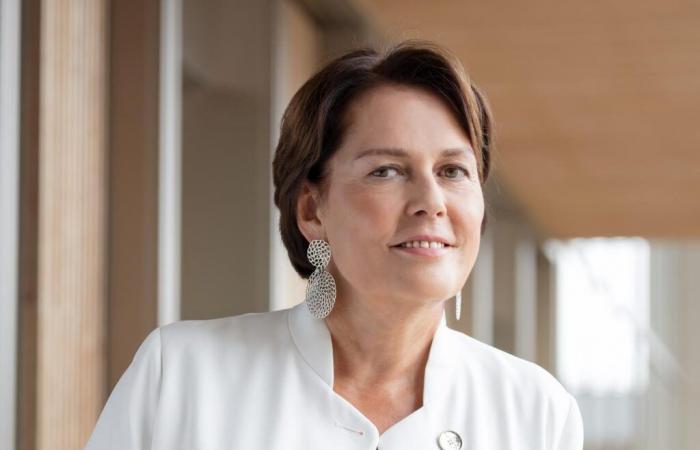Why is it important to be present for the inauguration of Belvédère, this emerging district on the right bank of Bordeaux?
There is only pleasure in the city if there is pleasure in life together, and this is what the Bordeaux Belvédère project is all about. This is an important inauguration, very consistent with Nexity's purpose and our ability to create a peaceful city district, accessible to all. Belvédère is emblematic for its mix of uses, including housing, offices – we have also installed our regional headquarters there –, a residence for Nexity Studéa students, cultural facilities, commerce… In all, 140,000 m2 floor area!
Belvédère symbolizes for us a land of conquest: at the time of the call for tenders, the request was to make the people of Bordeaux want to cross the river… In the end, the operation was successful. The proof: we sold this new district very well, which promotes living together and which is one of the largest development operations in France.
You are currently writing an essay, “In Praise of Cities”. Why this work?
I have a passion for cities. I worked for twelve years at the City of Paris as finance director then general secretary alongside Bertrand Delanoë, who had a real urban vision. And I have been with the Nexity group, the leading urban operator in France, for eight years. I have been a practitioner of the city for twenty years, convinced and optimistic about this subject. I like cities, small, medium, very large, which are often blamed for all the wrongs even though they are also extraordinary places to live. Before the Olympic Games, many said that Paris would be hell on earth, while we all experienced this city as magical…
We must free the city from the countdowns and the anxiety of the time we have left between now and 2050. I want us to build this city of 2050 now! Belvedere is a good example. The city was designed so that people can live well right away, without waiting. The audacity represented by Belvédère, right bank, is an audacity that pays off, it is an optimistic vision of the city of today and tomorrow.
Is this book a work of observation or conviction?
It is an observation and it is the expression of my conviction. The sustainable city is nature in the city, real nature, visible, viable. The green, sustainable city is also a regenerated city, capable of transforming parking lots into housing, offices into housing… The green city is also that of a density which is designed by working on the beauty of public spaces. A green city facilitates walking and therefore health. The green city must encourage living together: this is what I call the blue city.
“A few years ago, we were building 450,000 homes per year in France. Next year we'll just produce 200,000.”
What do you mean by blue city?
It is a city accessible to all social categories, a peaceful city which allows all generations to live together. For this, the city, like the actors who make it, must transform. I made the choice to transform Nexity in depth, and we refocused on two professions, to create the green city as a developer and promoter, like at Belvédère, and to create the blue city as an operating developer. Still at Belvédère, we will fulfill this role by remaining the operator of the 124-room student residence.
The crisis has weakened the sector, it in fact limits its capacity to innovate and best prepare for the city of 2050, but we must find the means to revive the sector and innovation to reinvent the city and be able to once again praise the cities… This book is red, the color of life, of action, of daring. It aims to accelerate the green city and the blue city.
The crisis you mention is of an unprecedented scale, we are talking about 10,000 job losses per month in the construction industry currently…
A few years ago, 450,000 homes were built per year in France. Next year, we will just produce 200,000. What will become of construction companies? Even though I think that the decline in interest rates could revive households' appetite for home ownership, investment in real estate is at a standstill. We are fighting to restore access to property to first-time buyers by offering financial packages including zero-interest loans.
But our biggest problem currently is the decline in private investment in housing. We still lack a real housing policy, we also lack a land use planning policy. For three years I have been saying that we are heading towards disaster for the French who can no longer find housing and I have been told 'no, it will be fine'. I also say that the longer we wait, the higher the social cost of this crisis will be, and here we are.
“Valérie Létard, Minister of Housing, understands our issues and I think that the current Minister of the Economy [Armand Saint-Martin] is anchored in reality »
The hardest part may be behind you, but what is the social impact of the current crisis for Nexity?
Like any sector which loses 40% of its activity, real estate is suffering terribly. Nexity got through the crisis by refocusing its activities and adapting its size to that of the new market. We are cutting 500 positions, or nearly 20% of the promotion workforce and associated support functions. We recalibrated our offers last September and we noted a return from first-time buyers, who prefer to buy than rent. We have set up a subsidized zero-rate loan offer in partnership with LCL. We also work on strong environmental and economic issues for our clients, like the water consumption of our homes, for example…
In short, we are fighting but in a climate of uncertainty which remains very high. The good news is that when I speak to Valérie Létard, the Minister of Housing, she knows, she understands our issues, and I think that the current Minister of the Economy [Armand Saint-Martin, NDLR] is anchored in reality.
(1) “In Praise of Cities”, by Véronique Bédague, Éditions de l’Aube, “Paroles d’Acteurs” collection, 192 pages, 18 euros.






